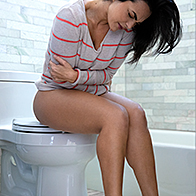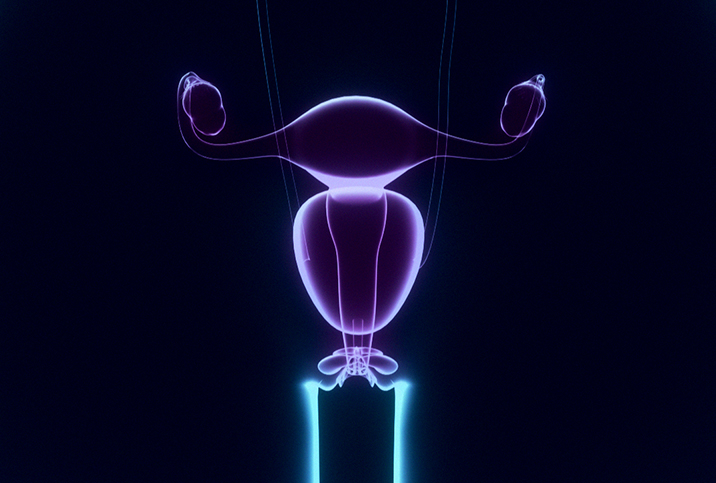A Dating Guide for Living With Pelvic Inflammatory Disorder

When you're striking out into the world of dating, the last thing you want is for your pelvic region to morph electrifying experiences into agonizing anecdotes.
Pelvic inflammatory disease (PID) causes chronic pelvic pain, often resulting in painful sex. While recent figures are sparse, a 2013-14 national survey found 4 percent of women in the United States self-reported a diagnosis of PID, translating to an estimated 2.5 million women. One in eight of women with a history of PID also report fertility difficulties.
In recent years, cases have dropped, which may be because of more regular testing for sexually transmitted infections (STIs) such as chlamydia and gonorrhea—two of the main infections that can lead to PID.
Exploring romantic potential with new partners should be a relatively serene process—minus the trials and errors of dating apps and experiences with ghosting—but living with a condition that interferes with genital-related fun feels like a prison sentence for your sex life. But fear not, PID is a manageable condition that does not require saying goodbye to an untroubled dating life.
How does PID affect the body?
Symptoms of PID can be mild or unnoticeable, however, symptoms may also have a rapid onset. The condition is typically diagnosed via an exploration of your medical history, a pelvic exam and a vaginal culture to take a sample of any bacteria.
"PID is an infection of the uterus, tubes and pelvic tissues," said Tara Scott, M.D., medical director of integrative medicine at Summa Health. "This is usually caused by a sexually transmitted infection like chlamydia or gonorrhea. Depending on the severity, symptoms could be vaginal discharge and pelvic pain. If more severe, symptoms could be fever, body aches and fatigue."
The condition is often painful and, because it stimulates inflamed and chronically congested reproductive tissues, interferes with penetrative vaginal intercourse.
Fear not, PID is a manageable condition that does not require saying goodbye to an untroubled dating life.
As PID is often caused by untreated STI infections, OB-GYN Nitu Bajekal, M.D., advised: "Chlamydial infections are usually silent, so ensuring that both you and your partner are checked for STIs before starting a sexual relationship is good practice."
Usually, PID is treated using antibiotics but in rare cases, surgery may be required to clear out blockages, as stay-at-home-mom Michael Erickson experienced firsthand.
"I was 21 when I had my first surgery to diagnose me with PID. I also have blocked tubes from the scar tissue the PID caused," she explained. "My pains started when I was in my late teens, but finally I was able to have a surgery to tell me why. I had horrible random sharp pains deep inside my pelvic area that some days could drop me to the floor. Intercourse would be extremely painful sometimes."
If caught early, PID is curable, however, treatment does not undo the damage already done to the reproductive organs, meaning it could cause long-term chronic pain.
The impact of PID on dating confidence
As PID is still shrouded in stigma, like so many other gynecological conditions, it is difficult to talk about it when dating, especially because of the impact it has on self-esteem.
"Having PID has made me lose most of my self-confidence," Erickson said. "Some days it ruins all my sexual confidence from the pain and bloating. Some days I feel great—then I'll have some major bad days that bring all the waves of zero confidence."
Sadly, a lack of clear communication from doctors feeds the shame and embarrassment that comes with a new diagnosis. For chronic illness blogger Corin, who is based in Birmingham, England, the condition became a difficult obstacle to move past. "Initially, I felt unclean and like it was a huge barrier," she said. "I was given no information at the hospital on why I had it, what it meant for me and what treatment would be."
Sometimes the condition—and the pain that comes with it—requires checking out of sexual situations, but it does not have to be a permanent cramp on your love life.
Managing PID and sex
Finding ways to effectively manage the condition and communicate how it impacts your life is the easiest way to curate a successful dating life with PID.
"Knowing one has had an STI which has left the person in chronic pain can make a woman feel hesitant and uncertain of embarking on a relationship," said Bajekal. "This could be because of an anxiety of contracting another infection or having to say no to sex because it is so painful. Be honest and open and discuss possible issues so your partner can be empathetic and patient."
Education is crucial to empowering yourself to date without unnecessary physical or emotional pain. Figuring out exactly how PID is affecting your body will enable you to express it clearly to a new partner. Hiding in silence only hurts yourself, as Erickson discovered when dating her now-husband.
"While we were dating I didn't know why I was always in so much pain, so I always just ignored it and sucked it up," she said. "Sometimes I still have to explain to my husband that I just can't. The pain takes over and I can't physically bring myself to even want to be touched."
Silence only breeds more pain, so do not be afraid to speak up with a new partner. Advocate for yourself and your needs. There is no shame in being unable to have sex because of a medical condition. Any date who disagrees with that sentiment needs to be deleted from your contacts list immediately.
Migrating away from shame
Dating with PID necessitates moving away from the shame that cocoons it in stigma. What that process looks like is your choice—you are the architect of your dating life.
For Corin, this meant taking an extended break from dating. She explained: "I was in a long-term relationship at the time [of diagnosis] but am now single, and actively not dating. I want to be comfortable with my own body before I date again."
The world loves to taint everything with stigma to keep people with medical conditions hiding on the outskirts of society, including the dating scene. But there is a bright, romantic world out there for you to explore. Being diagnosed with PID is not the end of all things romantic, sensual and sexy. Dating will simply require more foresight, crystal clear communication and firm boundaries with disrespectful people.
"It's not a dirty condition or anything to be ashamed of," added Corin. "You'll eventually learn to manage the pain and live a life that you love again. PID won't be the most important or biggest thing in your life."




















